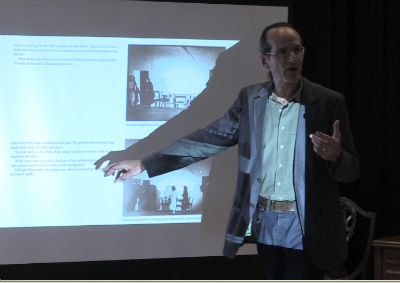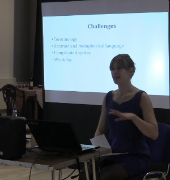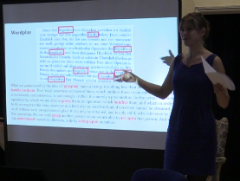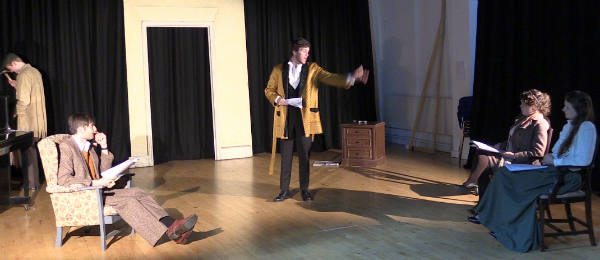By Romy Fursland
On Friday 20 June, the ‘Re-thinking Brecht’ colloquium was held at the Royal Central School of Speech and Drama in London. Scholars presented new insights into Brecht’s theory and practice and discussed their work on the Brecht into English and Writing Brecht projects. Subsequently, a group of actors gave a live performance of dialogues from Brecht’s Messingkauf (Buying Brass).
Steve Giles (Nottingham) spoke about Brecht’s critical reception, about different editions of Brecht’s work, and about the challenges of editing the Messingkauf to produce a consistent, reliable and readable whole. David Barnett (Sussex) explored the question of whether or not there is a ‘Brechtian style of acting’, making clear that Brecht did not lay down rigid prescriptions for actors but rather advocated a dialectical method of working. And Tom Kuhn (Oxford) discussed Brecht’s ‘modelbooks’, stressing that Brecht never thought of himself as a theorist and that his theoretical writing should not be considered as separate from his practice. Dr Kuhn also showed a fascinating selection of photographs from Brecht productions. 
 As one of the translators of the new editions of Brecht's theoretical writings, I talked through my experience of the translation process and highlighted some of the practical problems involved in dealing with Brecht's syntax, wordplay and wide variety of styles and registers. When translating Brecht’s early essays, for example, I was frequently confronted with long, syntactically complex sentences packed with relative clauses, like the one below:
As one of the translators of the new editions of Brecht's theoretical writings, I talked through my experience of the translation process and highlighted some of the practical problems involved in dealing with Brecht's syntax, wordplay and wide variety of styles and registers. When translating Brecht’s early essays, for example, I was frequently confronted with long, syntactically complex sentences packed with relative clauses, like the one below:
Wenn man dazunimmt, dass gerade er mit der gedankenlosen Gewohnheit aufgeräumt hat, in allem, was einem Tempel ähnlich sieht, nur mit gedämpfter Stimme statt laut und fröhlich zu sprechen, und dass gerade er bewiesen hat, dass wirklich wichtigen Erscheinungen gegenüber nur eine lässige (schnoddrige) Haltung die richtige ist, da sie allein eine wirklich Aufmerksamkeit und völlige Konzentration ermöglicht, so wird man begreifen, zu was für eine persönliche Freiheit er es gebracht hat.
Brecht’s use of wordplay can also pose problems for the translator, as in the sentence below:
Wir können den anderen nur begreifen, wenn wir in ihn eingreifen können. Auch uns selbst können wir nur begreifen, indem wir in uns eingreifen.
 Here Brecht plays on the verb ‘greifen’ (to grasp), which is a component of both ‘begreifen’ (to understand) and ‘eingreifen’ (to intervene). The English language does not allow for the same play on words in this context; my translations reads:
Here Brecht plays on the verb ‘greifen’ (to grasp), which is a component of both ‘begreifen’ (to understand) and ‘eingreifen’ (to intervene). The English language does not allow for the same play on words in this context; my translations reads:
We can only grasp another person when we are able to act upon that person. And we can understand ourselves, likewise, only by acting upon ourselves.
This is just one example of how difficult it can be to retain wordplay in translation.
The morning’s discussions were followed in the afternoon by a world first staging in English of the Messingkauf dialogues, performed by actors from the Central School of Speech and Drama. The actors' handling of this fragmentary material with its dense, difficult language was very impressive, and it was a treat to hear them and the director talk afterwards about their experiences of working with the text.

The colloquium was an enjoyable and enlightening day, and really highlighted the complexities and the rewards involved in re-thinking Brecht.
Romy Fursland is one of the translators for Writing Brecht: read more about her work.
Click here to read an actor's account of the Messingkauf/ Buying Brass performance.